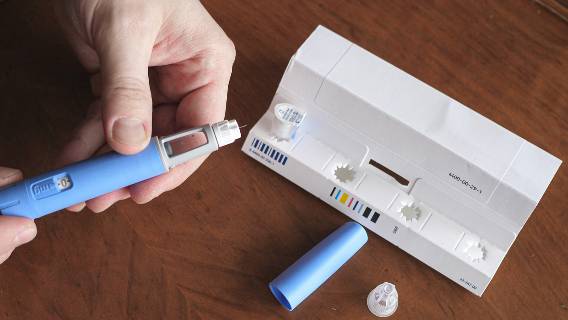EU: Some Ozempic, Wegovy Users Report Suicidal Thoughts
Editors carefully fact-check all Drugwatch.com content for accuracy and quality.
Drugwatch.com has a stringent fact-checking process. It starts with our strict sourcing guidelines.
We only gather information from credible sources. This includes peer-reviewed medical journals, reputable media outlets, government reports, court records and interviews with qualified experts.

Health officials in Europe are closely examining the safety of the popular weight loss drug Wegovy and others following users’ reports about thoughts of self-harm and suicide.
The European Medicines Agency, which evaluates and supervises pharmaceutical products, is investigating about 150 reports from people using liraglutide and semaglutide medicines who said they experienced self-harm ideations and other mental health issues.
An organization known as the Icelandic Medicines Agency, which reviews quality and safety of drugs and medical devices in Iceland, filed three reports of similar instances. Its investigation triggered the EMA inquiry.
Included in the inquiry are Novo Nordisk’s drugs Ozempic, Wegovy and Saxenda. Each contains glucagon-like peptide 1 receptor agonists, which mimic a hormone released in the gastrointestinal tract in response to eating. It prompts the body to create more insulin and interacts with the parts of the brain that reduce appetite and feelings of fullness.
“Liraglutide and semaglutide medicines are widely used, with an exposure of over 20 million patient-years [one patient-year is the equivalent of one patient taking a medicine for one year] to date,” the EMA wrote in a July 11 statement. “It is not yet clear whether the reported cases are linked to the medicines themselves or to the patients’ underlying conditions or other factors.”
Warning Labels Differ in EU and US
Warning labels on GLP-1 receptor agonist products in the EU do not include any information about suicide or self-harm thoughts, according to the EMA. In the U.S., the warning label on Wegovy lists “suicidal behavior or thinking” as a possible side effect of the drug, according to the U.S. Food and Drug Administration.
The FDA Adverse Event Reporting System public dashboard lists 60 reports of suicidal ideation since 2018 of people using semaglutide. There are about 70 similar reports for users of liraglutide since 2010, according to Reuters. The reports are not verified, and the existence of a report is not proof of causation, the FDA warns.
Currently in the EU, Saxenda and Wegovy are authorized for weight management, and Ozempic is used to treat Type 2 diabetes but has been used for off-label treatment of weight loss.
In a statement to Reuters, Novo Nordisk said it makes patient safety a top priority and takes adverse events seriously. The company’s own safety monitoring has found “no causal association” between self-harming thoughts and the drugs, according to the statement.
Mimi Tkito, of West Orange, New Jersey, was prescribed Saxenda in 2021 and Wegovy in 2022 for weight loss but hesitated to fill either prescription.
“Saxenda was expensive for a six-month treatment and the side effects, like thyroid cancer, discouraged me from using it,” Tkito told Drugwatch.com. “A year ago, I was prescribed Wegovy, and while the price was about the same, the warnings about suicide stopped me from filling it again.”
Tkito sees the results the drugs have for people who use them correctly, but the side effects gave her pause, she said. She still hopes to go on the weight loss drug eventually.
Skyrocketing Popularity Caused US Shortage
Other problems have plagued the prescription drug. As its popularity as a weight loss aid skyrocketed, it caused a shortage earlier this year. Some pharmacies compounded the drug with salt forms of semaglutide. The FDA does not verify the safety or effectiveness of compounded drugs.
The FDA wrote to the National Association of Boards of Pharmacy reminding pharmacies that Wegovy and Ozempic use the base form of semaglutide, not the salt form, which has a different active ingredient than the approved drug.
Compounded versions with the incorrect form of semaglutide would not be appropriate substitutions, according to the FDA. Currently there are no approved generic brands of the medicine.
In June, Novo Nordisk warned that a counterfeit Ozempic pen was found in the U.S. and purchased at a retail pharmacy. It contained another diabetes medication, not semaglutide, and caused an adverse reaction.
Anyone who has an adverse effect while using any of the drugs can report it to the FDA’s MedWatch Adverse Event Reporting program online or via fax at 1-800-FDA-0178.


